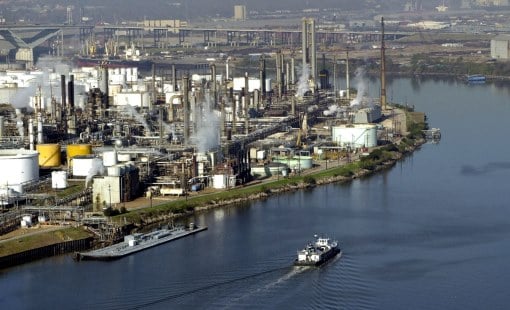The trend of higher payrolls and job growth seen in the rest of the nation is also being seen in Texas. So far, the lower oil prices are not killing the local Texas economy. In fact, the Texas Workforce Commission (TWC) showed that Texas gained 33,200 seasonally adjusted nonfarm jobs in the month of May. Source: Wikimedia Commons
Source: Wikimedia Commons
The Texas seasonally adjusted unemployment rate saw a slight increase in May, rising to 4.3% from 4.2% in April. Still, this compares to the official U.S. unemployment rate of 5.5%. Outsiders need to consider that there are of course some caveats to the quality and pay of these jobs, but the news still looks better than many might have expected.
The TWC showed that May’s gains were largely in the service industries. It was reported that the Leisure and Hospitality industry added 16,000 jobs, and Education and Health Services added 12,500 positions.
As far as the oil industry jobs, they are classified under Mining and Logging in the reports, and that fell by 6,000 to 294,000 in May from 300,000 in April of 2015, and it was lower than the 303,300 in May 2014. Losses were also seen in the Goods Producing sector: -1,500 in construction and -6,700 in manufacturing.
ALSO READ: The Richest Town in Each State
The TWC quotes were combined for simplicity here as follows:
Employers in Texas continue to create jobs in the dynamic Texas economy. Our state provides many advantages to businesses that make Texas their home, and I encourage employers to use the many resources provided through the Workforce Solutions network for their hiring needs. … The Texas civilian labor force now stands at more than 13 million workers and each of them have talents and abilities to contribute to our great state. The Texas Workforce Commission and its workforce partners continue to pursue the mission of connecting every Texan who wants a job to an employer who needs his or her skills.
This is one of those reports that sounds good, but all in all is mixed when you consider which jobs are growing and which are shrinking. There may be a stark difference in the pay of many of these positions, and oil jobs are higher nominally and have a larger economic spending benefit footprint than most other jobs.
At the end of the day, things are still looking better than they might have seemed just a few months ago, when oil was closer to $45 per barrel.
ALSO READ: The Best and Worst States to Be Unemployed
Essential Tips for Investing: Sponsored
A financial advisor can help you understand the advantages and disadvantages of investment properties. Finding a qualified financial advisor doesn’t have to be hard. SmartAsset’s free tool matches you with up to three financial advisors who serve your area, and you can interview your advisor matches at no cost to decide which one is right for you. If you’re ready to find an advisor who can help you achieve your financial goals, get started now.
Investing in real estate can diversify your portfolio. But expanding your horizons may add additional costs. If you’re an investor looking to minimize expenses, consider checking out online brokerages. They often offer low investment fees, helping you maximize your profit.
Thank you for reading! Have some feedback for us?
Contact the 24/7 Wall St. editorial team.



